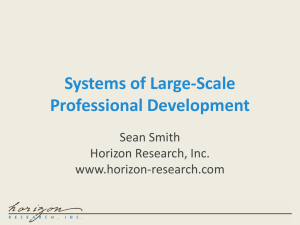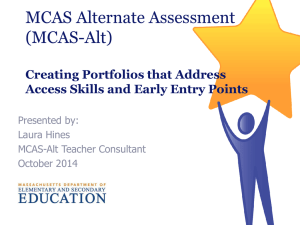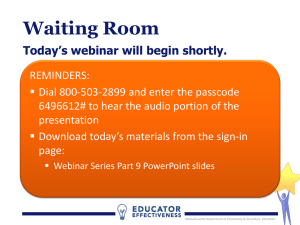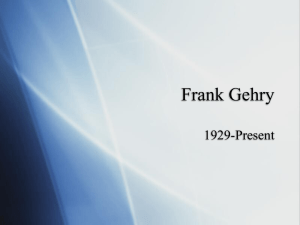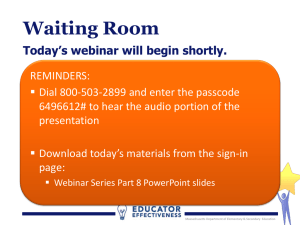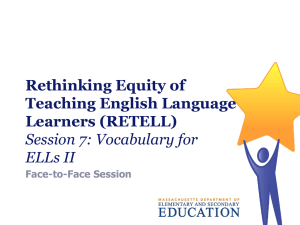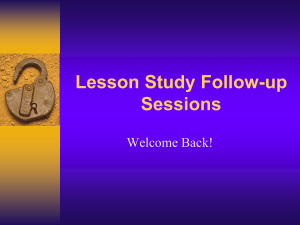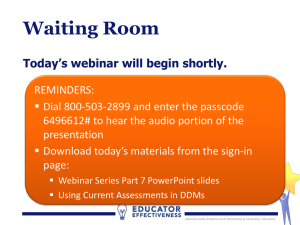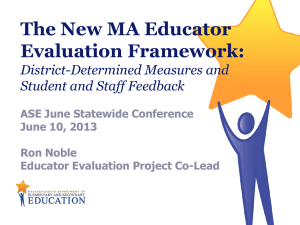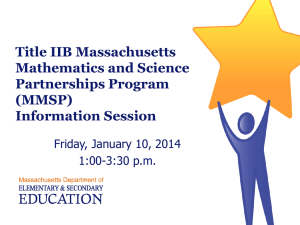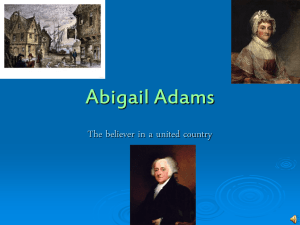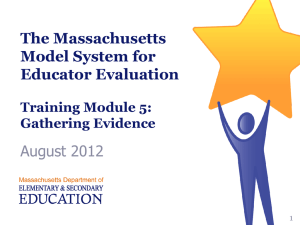ELA Rigor Deep-Dive - Boston Public Schools
advertisement
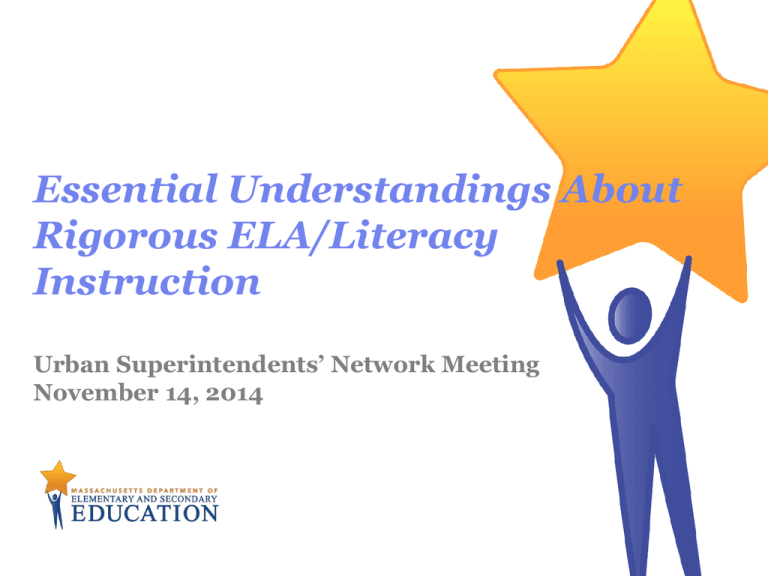
Essential Understandings About Rigorous ELA/Literacy Instruction Urban Superintendents’ Network Meeting November 14, 2014 Goals for this session To establish a shared definition of “a rigorous ELA/literacy experience for all students;” To gain a deeper understanding of what rigor looks like in practice 22 Massachusetts Department of Elementary & Secondary Education Part 1: Rigor Bringing Theory to Practice Questions from schools and districts “What are we asking students to do (to meet the expectations of the MA Frameworks, MCAS and PARCC?)” “ How do we get everybody (not just ELA) ready for PARCC?” “How do we move from test prep to teaching kids to think independently?” 44 Massachusetts Department of Elementary & Secondary Education What is rigor? rig·ornoun \ˈri-gər\ rigors :the quality or state of being very exact, careful, or strict. Also, a condition that makes life difficult…and rigor mortis http://www.merriam-webster.com/dictionary/rigor Learning in the classroom of accomplished teachers is “rarely silent and deadening, and it (is) often intense, buzzing, and risky.” Hattie, J. 2009. Visible Learning: A Synthesis of over 800 Meta-Analyses Relating to Achievement. New York: Routledge. p. 26 Massachusetts Department of Elementary & Secondary Education 5 Rigor Myths 66 http://www.teachthought.com/learning/7-myths-aboutrigor-in-the-classroom/ Massachusetts Department of Elementary & Secondary Education Working Definition Rigor is the level of engagement, skills and knowledge needed to successfully meet challenging expectations. 77 Massachusetts Department of Elementary & Secondary Education New Bloom’s 4 Domains: Factual, Conceptual, Procedural, Meta-cognitive Massachusetts Department of Elementary & Secondary Education 88 3 Worlds of Learning . . . Surface - knowledge telling Deep understanding- thinking skills Constructing knowledge and reality 99 Massachusetts Department of Elementary & Secondary Education . . . as reflected in MA ELA/Literacy Framework 1. Surface – Knowledge Key Ideas and Details/Text Types and Purposes 2. Deep(er) understanding – Skillfulness Craft and Structure/Production and Distribution 3. Constructing Knowledge – Integration Integration of Knowledge and Ideas/Research To gain independence 10 10 Range of reading/writing Massachusetts Department of Elementary & Secondary Education But what does it look like? 11 Massachusetts Department of Elementary & Secondary Education PARCC as one representation of rigor in the MA ELA/Literacy Framework 12 Massachusetts Department of Elementary & Secondary Education Question: In what ways do the following 3 items from PARCC represent the rigor of the MA ELA/Literacy standards? 13 13 Massachusetts Department of Elementary & Secondary Education PARCC – grade 11 Sample Item #7—Part A In his letter, John Adams tells his wife that “through all the gloom, I can see the rays of ravishing light and glory.” Which paraphrase explains what Adams means by this statement? a) Although I see the gloom (the announcement of independence), I also see the light and glory (the fighting we will have to do against Great Britain). b) Although I see the gloom (the war we must continue to fight), I also see the light and glory (the complete independence of our new country from Great Britain).* c) Although I see the gloom (the disgrace of declaring independence from Great Britain), I also see the light and glory (the many causes of the revolution). d) Although I see the gloom (the hope with which independence from Great Britain was declared), I also see the light and glory (the approval of future generations). 14 Massachusetts Department of Elementary & Secondary Education 14 Sample Item #7—Part B Which quotation from the text best reflects the meaning of “through all the gloom, I can see the rays of ravishing light and glory”? a) “You will see in a few days a Declaration setting forth the causes which have impelled us to this mighty revolution, which will justify it…” (paragraph 1) b) “…I am surprised at the suddenness as well as greatness of this revolution.” (paragraph 2) c) “It is the will of Heaven that the two countries should be sundered forever. It may be the will of Heaven that America shall suffer calamities still more wasting, and distresses yet more dreadful. (paragraph 2)* 15 d) “I am apt to believe that it will be celebrated by succeeding generations as the great anniversary festival.” (paragraph 5) 15 Massachusetts Department of Elementary & Secondary Education Sample Item #10 Both John and Abigail Adams believed strongly in freedom and independence. However, their letters suggest that each of them understood these terms differently based on their experiences. Write an essay that explains their contrasting views on the concepts of freedom and independence. In your essay, make a claim about the idea of freedom and independence and how John and Abigail Adams add to that understanding and/or illustrate a misunderstanding of freedom and independence. 16 Support your response with textual evidence and inferences drawn from all three sources. 16 Massachusetts Department of Elementary & Secondary Education PARCC and Rigor in MA ELA/Literacy Framework 1. Surface – Knowledge Key Ideas and Details/Text Types and Purposes Item 7A –knowledge - paraphrasing 2. Deep(er) understanding – Skillfulness Craft and Structure/Production and Distribution Item 7B – Understanding-Applying –direct quote 3. Constructing Knowledge – Integration Integration of Knowledge and Ideas/Research Item 10 –Analyzing, Evaluating – claim/evidence Massachusetts Department of Elementary & Secondary Education 17 17 Part 2: Rigor in the classroom How can we support students in meeting these rigorous expectations? Video - Background building to… Lesson 4: Supporting a Thesis with Textual Evidence from g. 12 Model Unit - Hamlet and Psychological Criticism Students develop criteria for the qualities of strong use of textual evidence. In small groups and then as a whole class, they use what they have learned about psychological criticism to analyze the character Polonius. They develop a thesis 19 statement and use evidence from the text to support their thesis. Massachusetts Department of Elementary & Secondary Education …Performance Assessment Summary/Overview g. 12 Hamlet and Psychological Criticism You are a crime scene investigator who has been charged with writing a full report on one of the deaths in the royal family or the nobility in the court of Denmark. You may choose to investigate the death of Prince Hamlet, Queen Gertrude, King Claudius, Laertes, or Ophelia. The records show how they died – but why did they die? How did their beliefs and desires – conscious or unconscious – lead to their deaths? Your evidence should come from Shakespeare’s play, Hamlet, 20 from what others have written about the characters, and from your research and knowledge of psychological criticism. Massachusetts Department of Elementary & Secondary Education Video - rigor in the classroom Model Curriculum Unit Project – View the video of one lesson from the grade 12 unit Hamlet and Psychological Criticism - English/Literacy High School 9-12 (from Chris Wright’s classroom, Everett High School) Practice “close watching” to respond to: What evidence do you see of rigorous content, skills and instruction? This video and others are available at the Model Curriculum Unit file page: http://www.doe.mass.edu/candi/model/files.html Massachusetts Department of Elementary & Secondary Education 21 21 Rigor in the Classroom 1. Surface – Knowledge Key Ideas and Details/Text Types and Purposes eg. Research on definition of psych. terms 2. Deep(er) understanding – Skillfulness Craft and Structure/Production and Distribution eg. Analysis of text; seeking evidence 3. Constructing Knowledge – Integration Integration of Knowledge and Ideas/Research eg. Analyze, Evaluate, Create – create, defend thesis with strategic quotes Massachusetts Department of Elementary & Secondary Education 22 22 It’s not that surface knowledge is necessarily bad and that deep knowledge is essentially good. It’s about balance… so that students become “teachers of their own learning.” Paraphrased from Hattie, J. 2009. p. 29 23 Massachusetts Department of Elementary & Secondary Education Questions, comments, or requests Dave Buchanan 781-338-6235 dbuchanan@doe.mass.edu 24 24 Massachusetts Department of Elementary & Secondary Education
